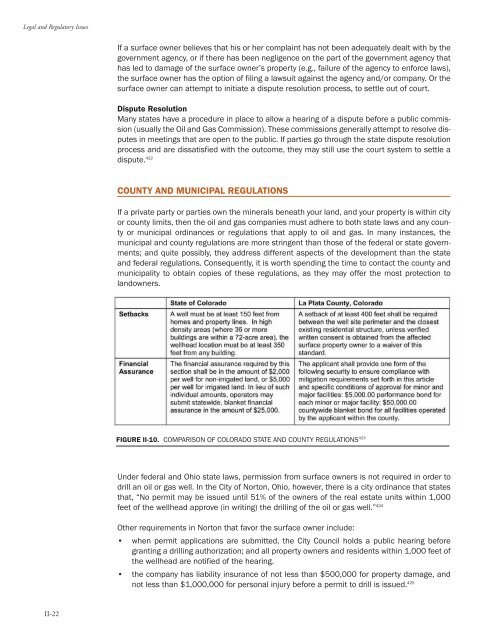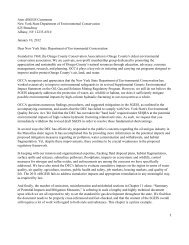Oil and Gas at Your Door? (2005 Edition) - Earthworks
Oil and Gas at Your Door? (2005 Edition) - Earthworks
Oil and Gas at Your Door? (2005 Edition) - Earthworks
Create successful ePaper yourself
Turn your PDF publications into a flip-book with our unique Google optimized e-Paper software.
Legal <strong>and</strong> Regul<strong>at</strong>ory Issues<br />
If a surface owner believes th<strong>at</strong> his or her complaint has not been adequ<strong>at</strong>ely dealt with by the<br />
government agency, or if there has been negligence on the part of the government agency th<strong>at</strong><br />
has led to damage of the surface owner’s property (e.g., failure of the agency to enforce laws),<br />
the surface owner has the option of filing a lawsuit against the agency <strong>and</strong>/or company. Or the<br />
surface owner can <strong>at</strong>tempt to initi<strong>at</strong>e a dispute resolution process, to settle out of court.<br />
Dispute Resolution<br />
Many st<strong>at</strong>es have a procedure in place to allow a hearing of a dispute before a public commission<br />
(usually the <strong>Oil</strong> <strong>and</strong> <strong>Gas</strong> Commission). These commissions generally <strong>at</strong>tempt to resolve disputes<br />
in meetings th<strong>at</strong> are open to the public. If parties go through the st<strong>at</strong>e dispute resolution<br />
process <strong>and</strong> are diss<strong>at</strong>isfied with the outcome, they may still use the court system to settle a<br />
dispute. 422<br />
COUNTY AND MUNICIPAL REGULATIONS<br />
If a priv<strong>at</strong>e party or parties own the minerals bene<strong>at</strong>h your l<strong>and</strong>, <strong>and</strong> your property is within city<br />
or county limits, then the oil <strong>and</strong> gas companies must adhere to both st<strong>at</strong>e laws <strong>and</strong> any county<br />
or municipal ordinances or regul<strong>at</strong>ions th<strong>at</strong> apply to oil <strong>and</strong> gas. In many instances, the<br />
municipal <strong>and</strong> county regul<strong>at</strong>ions are more stringent than those of the federal or st<strong>at</strong>e governments;<br />
<strong>and</strong> quite possibly, they address different aspects of the development than the st<strong>at</strong>e<br />
<strong>and</strong> federal regul<strong>at</strong>ions. Consequently, it is worth spending the time to contact the county <strong>and</strong><br />
municipality to obtain copies of these regul<strong>at</strong>ions, as they may offer the most protection to<br />
l<strong>and</strong>owners.<br />
FIGURE II-10. COMPARISON OF COLORADO STATE AND COUNTY REGULATIONS 423<br />
Under federal <strong>and</strong> Ohio st<strong>at</strong>e laws, permission from surface owners is not required in order to<br />
drill an oil or gas well. In the City of Norton, Ohio, however, there is a city ordinance th<strong>at</strong> st<strong>at</strong>es<br />
th<strong>at</strong>, “No permit may be issued until 51% of the owners of the real est<strong>at</strong>e units within 1,000<br />
feet of the wellhead approve (in writing) the drilling of the oil or gas well.” 424<br />
Other requirements in Norton th<strong>at</strong> favor the surface owner include:<br />
• when permit applic<strong>at</strong>ions are submitted, the City Council holds a public hearing before<br />
granting a drilling authoriz<strong>at</strong>ion; <strong>and</strong> all property owners <strong>and</strong> residents within 1,000 feet of<br />
the wellhead are notified of the hearing.<br />
• the company has liability insurance of not less than $500,000 for property damage, <strong>and</strong><br />
not less than $1,000,000 for personal injury before a permit to drill is issued. 425<br />
II-22




